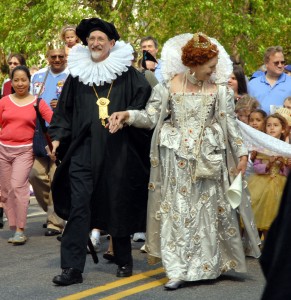
Europe and Eurasia: Remarks Following Meeting With Minister of Foreign Affairs …
April 7, 2014
Romanian PM: New generation of young politicians in Europe
April 7, 2014 
(Courtesy of the Shakespeare Folger Library)
On Sunday, even as revelers celebrate Shakespeare’s birthday at the Folger Library in Washington, former Supreme Court justice John Paul Stevens is raising doubts about the Bard’s identity.
In a QA published in the New York Times Book Review, Stevens says his “literary guilty pleasure” is reading ”about the authorship of the plays attributed to William Shakespeare.”
Oxfordians and others who insist that someone besides Shakespeare must have written those immortal works will be encouraged that the former justice manages to emphasize his theory two more times in this brief interview. Asked to name his literary hero, he says, “The author of the plays attributed to William Shakespeare.” Asked to imagine his ideal literary dinner party, he invites “Samuel Clemens, Charles Dickens and the author of the Shakespeare canon.”
Caveat lector!
Gary Taylor, general editor of “The New Oxford Shakespeare,” isn’t impressed by Stevens’s imprimatur. “Anyone is entitled to an opinion about the value of a work of art,” he says. “But we don’t ask Supreme Court justices to give verdicts on evolutionary microbiology or ice core samples or the economic and religious history of a 16th-century Czechoslovakian parish.”
There is such a thing as scholarship, Taylor argues, even expertise. “Conspiracy theories about the authorship of Shakespeare’s plays all depend upon a failure to respect the simple distinction between literature, which rightly belongs to everyone, and literary history, which, like legal history, is not a hobby, but a specialist discipline, best debated and adjudicated by experts. Don’t rely on my opinion of case law, and don’t rely on John Paul Stevens’s opinion about the authorship of ‘A Midsummer Night’s Dream.’”
This is not the first time Stevens has waded into the Authorship Question. Back in 2009, he raised his doubts in an interview with the Wall Street Journal. Since then, Roland Emmerich’s ridiculous costume drama “Anonymous” has popularized the debate about the real identity of the Elizabethan playwright.
For scholars this is a wearisome distraction from real work. Harvard professor Stephen Greenblatt wrote a bestselling biography of Shakespeare in 2004, but that’s done little to quell the Flat Earth speculation about who really wrote “Hamlet.” Perhaps, for some people, this question is beyond all rational evaluation. Every piece of evidence is only more proof of just how elaborate the Shakespeare deception is. At this point, Greenblatt seems resigned to let them have their fun.
“Justice Stevens says that his literary guilty pleasure is to read writings about the so-called authorship question in Shakespeare,” Greenblatt tells me. “I see no reason to deny anyone a guilty pleasure that is, as this one seems to me, in the category of speculations that the moon landing was staged in a Hollywood film studio or that extraterrestrials crashed in Roswell, New Mexico. William Shakespeare of Stratford-upon-Avon was a celebrity in his own time. It is about as likely that someone else wrote his plays as it is that someone else — the current Earl of Oxford, perhaps — wrote all of Justice Stevens’s opinions.”
Meanwhile, the man attributed with writing those opinions will be at the Sixth I Historic Synagogue on May 5, talking about his new book, “Six Amendments: How and Why We Should Change the Constitution.” Tickets ($20) will go on sale April 10 and are expected to sell out quickly. For details, call Sixth I (202-408-3100) or Politics Prose Bookstore (202-364-1919).

